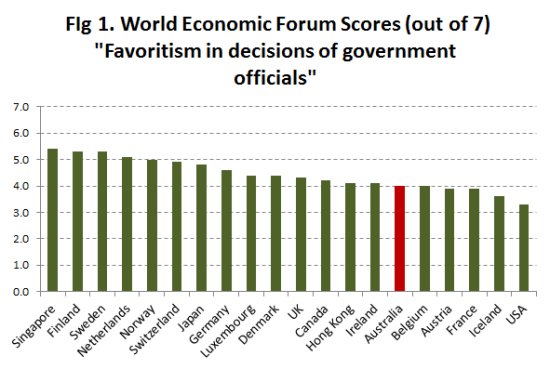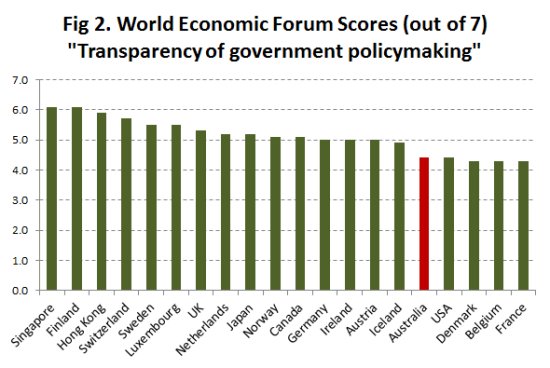“Kick this mob out” read the Telegraph’s headline on the first day of the election campaign last September. There was no sound reason for the invective — just a series of falsehoods about how the government had “turned Australia's boom times into a massive and ongoing debt” and had pursued “financially ruinous policies”.
There had indeed been a modest expansion of Commonwealth net debt during the period of the Rudd-Gillard Government – to 11 per cent of GDP, compared with around 90 per cent of GDP in other industrialised countries, but it was a normal and responsible response to the worst global recession for 80 years.
To have gone against the considered opinions of the international ratings agencies, who had given the Australian Government one of the world’s few AAA credit ratings, Murdoch’s myrmidons must have known something we lesser mortals didn’t know.
Perhaps they knew that once elected, the Abbott Government would manipulate the books to sap credibility from the previous Government’s fiscal projections — for example by transferring $9 billion to the Reserve Bank just to make to make Wayne Swan’s deficit forecast look worse.
Perhaps they knew why the Government had been struggling to rein in the budget deficit. Their public line, as stated in an editorial in The Australian, was that the deficit resulted from “spending profligacy”.
In fact, it had resulted from a collapse in revenue. Rupert Murdoch gave a hint that he knew this was the cause of the deficit when, on his election night tweet, he referred to “welfare scroungers sucking life out of the economy”, omitting to clarify that he must surely have been referring to corporate welfare, for between 2006-07 and 2012-13, corporate income tax had fallen from 5.3 to 4.3 per cent of GDP.
Had corporate taxes held up at the same rate as in the last years of the Howard Government, the Commonwealth would have had another $15 billion in revenue — nearly enough to close the $20 billion deficit in 2012-13.
And, as employees of News Corporation, perhaps they even had specific knowledge of how nearly a billion of that shortfall had arisen, because it is becoming clear that their own company, some time between August last year and February this year, has been given $882 million by the Commonwealth.
That’s 35 times what SPC Ardmona was seeking, and is quite a bit more than the $500 – $600 million annual budgetary assistance the entire auto industry has been receiving.
The payment arises from a long-standing dispute with the Australian Tax Office (ATO), which in July last year lost a case in the Federal Court of Appeal, thus allowing News Corporation to claim a loss of $2 billion in a series of loan deals. Details are given in yesterday’s Financial Review — in essence they relate to intra-corporate transactions, and because of the high Australian dollar, it was convenient for News Corporation to have the loss realised in Australia.
I claim no expertise in tax law, but the most extraordinary aspect of this case is that, in spite of the amount at stake, the ATO decided not to appeal the decision. It just meekly yielded to Murdoch.
The ATO deadline for appeal was 22 August, which rules out any suggestion of intervention by the Coalition before being elected — it would take a conspiracy theorist with Le Carre’s gifts to develop a credible story on those lines.
But it raises questions about the integrity of our institutions. Institutions must not only behave with integrity; they must also be seen to behave with integrity. “The Australian Government, cowed by a bullying and lying foreign media giant, lets it off a billion dollar tax debt” is the way a foreign tabloid may frame it. Not a good look.
In Australia we often see ourselves as behaving with high standards, and indeed, on measures of corruption we come out reasonably well on a world scale. The corruption revealed in the NSW ICAC is about as bad as it gets. But world rankings set an easy hurdle — it’s easy to score more highly than Nigeria, Albania and Venezuela.
If we restrict the competition to the 20 highest income “developed” countries, Australia doesn’t look so pretty. The two graphs below are taken from the 2013-14 Global Competitiveness Report, on the dimensions “favoritism in decisions of government officials” and “transparency of government policymaking”. In comparison with these other countries we score poorly.


Such scores are not mere snapshots; they result from the accumulation of informed opinion over a long period. From 1973 (when the Tariff Board became the Industries Assistance Commission) Australia has led the world in exposing the incidence and cost of tariff assistance, but in other areas of economic policy our decision-making has been opaque. Our mining and finance sectors have done very well from government largesse, with little if any exposure of the policy justification for their privileges, and at a state and local level there is a long history of shonky deals involving land zoning and deals over local infrastructure such as airports, dams and roads.
As the Australian Electoral Commission’s returns show, contributions from corporations, unions, business lobbies and rich individuals who hide behind nominee companies dwarf individual contributions to political parties. Just today we learn how a former lobbyist for the alcohol industry, a major corporate donor in the 2013 campaign, managed to be appointed as chief of staff to the Assistant Health Minister Fiona Nash and persuade her to abolish funding for the Alcohol and Other Drugs Council.
That is background, explaining much about our poor rankings, but the Abbott Government, with its partisan appointments and handouts to the chosen few ($16 million for a chocolate factory in a marginal electorate, $5 million for a football team owned by News Corporation, a blind eye to the salary packagers’ tax rorts) shows a contempt for integrity and democratic processes not seen since the days of the Bjelke-Petersen Government in Queensland.
Abbott has become Australia’s Silvio Berlusconi, with one important difference: Berlusconi relied on a partisan media which he owned and controlled. Abbott’s partisan media is provided by Rupert Murdoch. Australia may be “open for business”, but Abbott should add the rider “if you’re well-connected”.
Such favourable treatment of the well-connected is one side of Abbott’s cronyism. The other side is his war on those he perceives to be his enemies — trade unions, scientists, the national broadcaster, those who call for asylum-seekers to be treated with decency and respect.
Five hundred years ago Niccolò Machiavelli warned about the risks of such hubris. The prince should not assume his critics are his enemies — to do so is not only isolating. It also swells the ranks of opponents by converting friendly critics into enemies.
That isolating hubris could be what eventually destroys the Abbott Government. If the Opposition were to awake from its torpor and stoke a fire in its leader’s belly, its downfall could be hastened, for the longer it takes, the harder will be the necessary unravelling of privilege and repair to our reputation and institutions.
Donate To New Matilda
New Matilda is a small, independent media outlet. We survive through reader contributions, and never losing a lawsuit. If you got something from this article, giving something back helps us to continue speaking truth to power. Every little bit counts.



